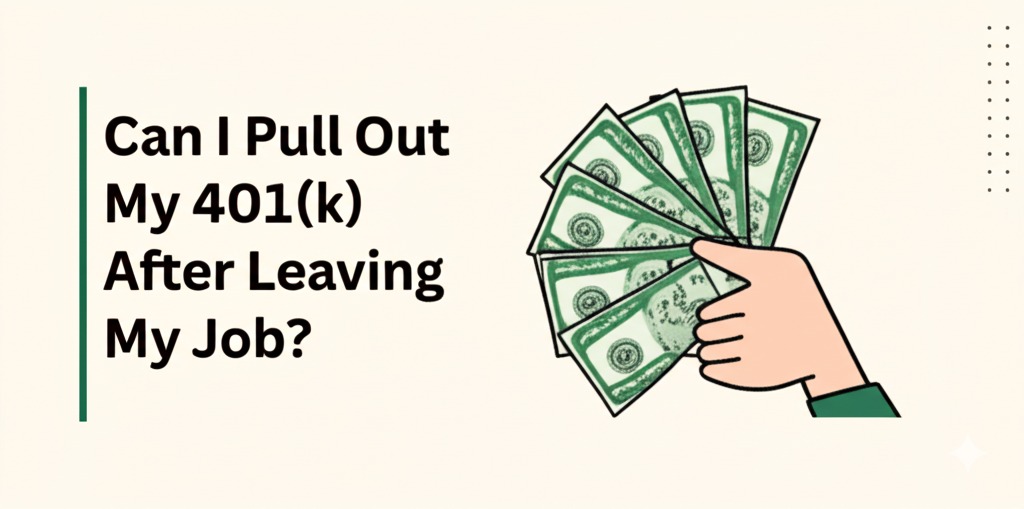
Leaving a job often brings a mix of emotions – excitement for new opportunities, nervousness about what lies ahead, and sometimes, confusion about what to do with your finances. If you’ve recently left a job, one of the key questions you may be asking yourself is whether you can pull out your 401(k). After all, it’s your hard-earned money, and you might need it during this transition period. But before you make any hasty decisions, it’s important to understand the rules, tax implications, and available options.
In this article, we’ll walk you through everything you need to know about pulling out your 401(k) after leaving a job, so you can make an informed choice about what’s best for your financial future.
Understanding 401(k) Plans
Before diving into whether you can pull out your 401(k) after leaving a job, it’s helpful to understand what a 401(k) is and why it’s important for your retirement savings.
A 401(k) is an employer-sponsored retirement savings plan that allows you to contribute a portion of your salary to a retirement fund. Many employers match contributions up to a certain percentage, which can be a valuable benefit. Your 401(k) investments grow tax-deferred until you withdraw them during retirement.
What Happens to Your 401(k) When You Leave Your Job?
When you leave your job, your 401(k) doesn’t just disappear. You still have access to the money you’ve accumulated, but how you manage it will depend on your situation and your goals. Here are your main options:
Option 1: Leave Your 401(k) with Your Previous Employer
If your former employer allows it, you can leave your 401(k) with them. Many employers will let you keep your plan in place even after you leave. However, this option has its pros and cons.
Pros:
- No immediate action needed: You don’t need to make any decisions right away.
- Investment choices remain intact: You can continue with the investments you’ve already chosen.
Cons:
- Limited control: You may not be able to make changes to your plan or have access to certain investment options.
- Higher fees: Some employers charge higher fees for former employees to maintain their 401(k) accounts.
Option 2: Roll Over Your 401(k) into an IRA
A popular option is to roll your 401(k) over into an Individual Retirement Account (IRA). This allows you to take full control of your retirement savings and keep your investments growing tax-deferred.
Pros:
- More investment options: IRAs typically offer a wider variety of investment choices compared to 401(k) plans.
- Control over your account: You have more flexibility to manage your account and make decisions about your investments.
Cons:
- Complexity: Rolling over your 401(k) into an IRA may require some paperwork and planning.
- Different tax treatment: While IRAs offer more options, they also have different rules regarding withdrawals and required minimum distributions (RMDs).
Option 3: Cash Out Your 401(k)
One option that many people consider is cashing out their 401(k) after leaving a job. However, this is usually not the best choice unless you’re in dire need of funds.
Pros:
- Immediate access to cash: If you’re facing financial hardship, cashing out might give you the immediate funds you need.
Cons:
- Tax penalties: If you’re under 59½, you’ll face a 10% early withdrawal penalty in addition to income tax on the withdrawal.
- Loss of retirement savings: Cashing out your 401(k) reduces the amount you have for retirement, potentially leaving you with fewer funds when you need them most.
Option 4: Transfer Your 401(k) to a New Employer’s Plan
If you’ve moved on to a new job, you may be able to transfer your old 401(k) to your new employer’s plan. This is known as a 401(k) rollover.
Pros:
- Consolidation: Having all your retirement funds in one place can make it easier to manage and track.
- No tax penalties: Since you’re rolling over your 401(k) into a new employer’s plan, you avoid taxes and penalties.
Cons:
- Limited options: Not all employers allow you to roll over your 401(k) from a previous job.
- Waiting periods: Some employers may have restrictions or waiting periods before you can transfer your funds.
Tax Implications of Withdrawing Your 401(k)
If you decide to cash out your 401(k) after leaving your job, it’s essential to understand the tax consequences. When you withdraw from your 401(k), the amount is considered taxable income. Here’s what to keep in mind:
- Income taxes: You’ll owe regular income tax on the amount you withdraw from your 401(k).
- Early withdrawal penalty: If you’re under 59½, you’ll face a 10% penalty in addition to the regular income tax.
- State taxes: In some states, your withdrawal may also be subject to state income taxes.
Should You Cash Out Your 401(k)?
Cashing out your 401(k) should generally be a last resort. The taxes and penalties involved can significantly reduce the amount you receive, and you’re missing out on valuable retirement savings. Instead, consider rolling over your 401(k) into an IRA or your new employer’s 401(k) plan. These options allow your savings to grow tax-deferred and ensure you have funds for retirement.
Conclusion: Making the Right Choice for Your 401(k)
When you leave a job, you have several options for managing your 401(k). Whether you decide to leave it with your previous employer, roll it over into an IRA or new 401(k), or cash it out, each choice has its own benefits and drawbacks. It’s crucial to consider your long-term financial goals and the potential tax implications before making a decision.
If you’re unsure which option is right for you, it may be worth consulting with a financial advisor who can help guide you through the process. Make the right choice now to secure a comfortable financial future down the road.
4o mini

Andre Cuevas provides career insights, job search strategies, and professional advice to help individuals navigate the job market and achieve their career goals.






